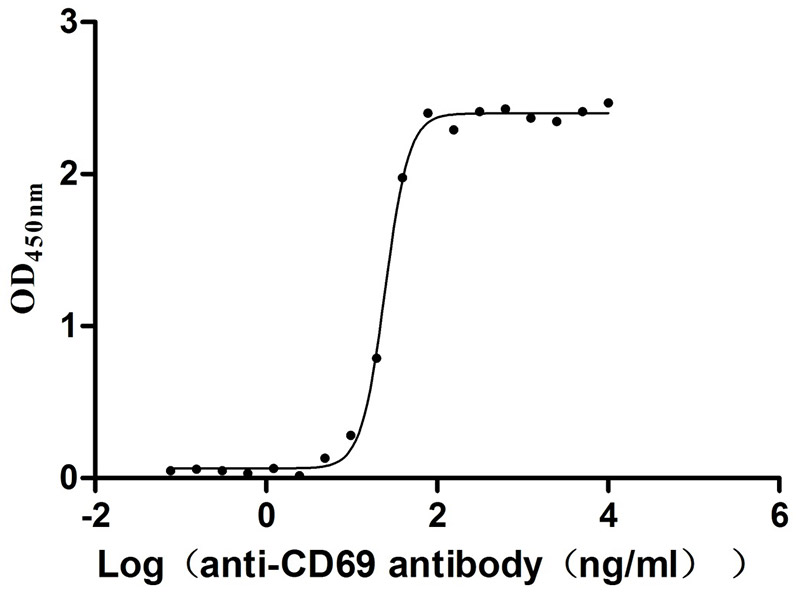Recombinant Rat Paired box protein Pax-6 (Pax6)
-
货号:CSB-YP017492RA
-
规格:
-
来源:Yeast
-
其他:
-
货号:CSB-EP017492RA
-
规格:
-
来源:E.coli
-
其他:
-
货号:CSB-EP017492RA-B
-
规格:
-
来源:E.coli
-
共轭:Avi-tag Biotinylated
E. coli biotin ligase (BirA) is highly specific in covalently attaching biotin to the 15 amino acid AviTag peptide. This recombinant protein was biotinylated in vivo by AviTag-BirA technology, which method is BriA catalyzes amide linkage between the biotin and the specific lysine of the AviTag.
-
其他:
-
货号:CSB-BP017492RA
-
规格:
-
来源:Baculovirus
-
其他:
-
货号:CSB-MP017492RA
-
规格:
-
来源:Mammalian cell
-
其他:
产品详情
-
纯度:>85% (SDS-PAGE)
-
基因名:
-
Uniprot No.:
-
别名:Pax6; Pax-6; Sey; Paired box protein Pax-6; Oculorhombin
-
种属:Rattus norvegicus (Rat)
-
蛋白长度:Full length protein
-
表达区域:1-422
-
氨基酸序列MQNSHSGVNQ LGGVFVNGRP LPDSTRQKIV ELAHSGARPC DISRILQVSN GCVSKILGRY YETGSIRPRA IGGSKPRVAT PEVVSKIAQY KRECPSIFAW EIRDRLLSEG VCTNDNIPSV SSINRVLRNL ASEKQQMGAD GMYDKLRMLN GQTGSWGTRP GWYPGTSVPG QPTQDGCQQQ EGQGENTNSI SSNGEDSDEA QMRLQLKRKL QRNRTSFTQE QIEALEKEFE RTHYPDVFAR ERLAAKIDLP EARIQVWFSN RRAKWRREEK LRNQRRQASN TPSHIPISSS FSTSVYQPIP QPTTPVSSFT SGSMLGRTDT ALTNTYSALP PMPSFTMANN LPMQPPVPSQ TSSYSCMLPT SPSVNGRSYD TYTPPHMQTH MNSQPMGTSG TTSTGLISPG VSVPVQVPGS EPDMSQYWPR LQ
-
蛋白标签:Tag type will be determined during the manufacturing process.
The tag type will be determined during production process. If you have specified tag type, please tell us and we will develop the specified tag preferentially. -
产品提供形式:Lyophilized powder
Note: We will preferentially ship the format that we have in stock, however, if you have any special requirement for the format, please remark your requirement when placing the order, we will prepare according to your demand. -
复溶:We recommend that this vial be briefly centrifuged prior to opening to bring the contents to the bottom. Please reconstitute protein in deionized sterile water to a concentration of 0.1-1.0 mg/mL.We recommend to add 5-50% of glycerol (final concentration) and aliquot for long-term storage at -20℃/-80℃. Our default final concentration of glycerol is 50%. Customers could use it as reference.
-
储存条件:Store at -20°C/-80°C upon receipt, aliquoting is necessary for mutiple use. Avoid repeated freeze-thaw cycles.
-
保质期:The shelf life is related to many factors, storage state, buffer ingredients, storage temperature and the stability of the protein itself.
Generally, the shelf life of liquid form is 6 months at -20°C/-80°C. The shelf life of lyophilized form is 12 months at -20°C/-80°C. -
货期:Delivery time may differ from different purchasing way or location, please kindly consult your local distributors for specific delivery time.Note: All of our proteins are default shipped with normal blue ice packs, if you request to ship with dry ice, please communicate with us in advance and extra fees will be charged.
-
注意事项:Repeated freezing and thawing is not recommended. Store working aliquots at 4°C for up to one week.
-
Datasheet :Please contact us to get it.
靶点详情
-
功能:Transcription factor with important functions in the development of the eye, nose, central nervous system and pancreas. Required for the differentiation of pancreatic islet alpha cells. Competes with PAX4 in binding to a common element in the glucagon, insulin and somatostatin promoters. Regulates specification of the ventral neuron subtypes by establishing the correct progenitor domains. Acts as a transcriptional repressor of NFATC1-mediated gene expression.
-
基因功能参考文献:
- Results demonstrate that the miR-365-PAX6 system regulates the conversion of astrocytes into neurons in the ischemic brain. Both exogenous expression of PAX6 and administration of miR-365 antagomir are likely to promote brain repair by enhancing neurogenesis in adult mammalian brain following ischemic injury. PMID: 29451327
- Four upregulated transcription factors Pax6, Tp73, Cebpd, and Spi1, appeared as potent regulators of chronic post-traumatic brain injury (TBI) gene expression. They regulate molecular networks contributing to post-injury secondary damage, including apoptosis and inflammation, strengthening the feasibility of therapeutically targeting these molecular networks even after the acute post-TBI period. PMID: 29482641
- These results suggest that Pax6 immunoreactivity showed diverse patterns in the neurogenic zone after prenatal hypoxia and Pax6 has important effects on neurogenesis PMID: 29102934
- analysis of the effect of Pax6 mutation on brain morphology and sex differences PMID: 27355350
- High-fat diet feeding during pregnancy may induce insulin resistance in maternal rats by inhibiting pancreatic Pax6 and its target genes expression. PMID: 26191217
- Up-regulation of Pax6 in neural progenitor cells plays an essential role in valproate-induced glutamatergic differentiation. PMID: 24030726
- High glucose suppresses Pax6 expression in pancreatic beta-cells. PMID: 24953606
- Pax6-transfected cells exhibited a similar growth curve (P>0.05), suggesting that the Pax6 5a has a similar effect on the proliferation of rMSCs as Pax6 PMID: 24952136
- Our observations reveal intensive astroglial de-differentiation and proliferative response, reflected by dynamic Pax6 up-regulation PMID: 24114637
- findings suggest that dual regulation of proneural genes mediated by Pax6 and Dmrt family members is crucial for cortical neurogenesis PMID: 23679989
- Pax6 is essential for maintaining Neural stem/progenitor cells & determining their differentiation fates. PMID: 22944581
- Results indicate that Pax6 acts on the regulation of glucagon secretion at least through the transcriptional control of GCK, GPR40, and GIPR. PMID: 22778220
- The direct action of Pax6 on PC1/3, GK, Nkx6.1, GLP-1R, and GIPR gene promoters is elucidated through identification of functional binding sites in each promoter region. PMID: 22403172
- Pax6 decreases the number of Neuron-Glia 2 progenitor cells and prevents oligodendrocytic lineage commitment, while repression of Olig2 results in an expanded astrocytic lineage. PMID: 22162276
- provide evidence that Pax6 binds to the olig2 promoter and that an HEB sequence in the promoter is required for the Pax6 repression of olig2 transcription PMID: 21698109
- Pax6 seems to be required for coordinating boundary-cell specification and reducing neurogenesis within the hindbrain boundary region PMID: 21501682
- Results suggest Dlx2 and Pax6 may play a prominent role in directing neural precursor cell proliferation and neuroblast generation following striatal cell loss. PMID: 21397028
- Pax6 has a role in the rat model of autism PMID: 21203536
- at low concentrations of glucose, Pax6 is localized in the nucleus and prevents the activation of the insulin gene by occupying the PDX-1 binding site and by interacting with BETA2 PMID: 20943817
- Results describe the expression of Pax6 and Sox2 in normal olfactory epithelium and during epithelial regeneration after methyl bromide lesion or olfactory bulbectomy. PMID: 20852734
- Pax6 is critical for alpha cell function and differentiation through the transcriptional control of key genes involved in glucagon gene transcription, proglucagon processing, and alpha cell differentiation PMID: 20592023
- Gene ontology analyses of the differentially expressed molecules demonstrated that Pax6 is involved in various signal transduction pathways where it regulates the expression of many receptors, signaling molecules, transporters and transcription factors. PMID: 20082710
- Pax6 regulates specification of the ventral neurone subtypes by establishing the correct progenitor domains PMID: 11880342
- brain-specific aldolase C gene could constitute a new target for the transcription factor Pax-6, which is implicated increasingly in neurogenesis PMID: 12370174
- Pax-6 plays a role in the migration of medullary precerebellar neurons, although neurons generated in the lower rhombic lip can nevertheless migrate and settle to form the external cuneate nucleus in the absence of Pax-6. PMID: 12534968
- Pax6's function in the control of cell proliferation and neuronal fate determination during embryogenesis is also operative in the adult hippocampus PMID: 16035109
- Pax6 regulation of Optimedin in the eye and brain may directly affect multiple developmental processes, including cell migration and axon growth PMID: 16115881
- An appropriate dosage of Pax6 is essential for production and maintenance of the GFAP+ early progenitor cells in the postnatal hippocampal neurogenesis PMID: 16164600
- Pax6-dependent boundary defines alignment of migrating olfactory cortex neurons via the repulsive activity of ephrin-A5. PMID: 16510508
- results demonstrate that fusion of the facial processes reduces the number of odontogenic placodes and is required to assemble all components at one site for rat upper incisor formation PMID: 16795023
- These findings indicate differential requirements for pax6 gene dosage in displaying function and maintaining architecture of adult pancreatic islets. PMID: 17178107
- Pax6 regulates the interkinetic nuclear migration by stabilizing the centrosome at the apical side. PMID: 17825043
- PAX proteins have also been implicated in maintaining stem cells in a committed but undifferentiated state but a role for PAX proteins in putative pancreas stem cells is not known PMID: 17849422
- Pax6 is a multifunctional player regulating proliferation and differentiation through the control of expression of different downstream molecules in a highly context-dependent manner [review] PMID: 18467663
- Studied PAX6 homeodomain for PAX6 binding and function on G1 and G3 in rat glucagon gene promoter. Data indicate a PH0-like binding of PAX6 to glucagon promoter elements G1 and G3 where the HD binding site is abutted directly to the PD binding motif. PMID: 19217949
显示更多
收起更多
-
相关疾病:Defects in Pax6 are the cause of a condition known as small eye (Sey) which results in the complete lack of eyes and nasal primordia.
-
亚细胞定位:Nucleus.; [Isoform 1]: Nucleus.; [Isoform 5a]: Nucleus.
-
蛋白家族:Paired homeobox family
-
数据库链接:
KEGG: rno:25509
STRING: 10116.ENSRNOP00000006302
UniGene: Rn.89724
Most popular with customers
-
Recombinant Human Leukemia inhibitory factor (LIF) (Active)
Express system: Mammalian cell
Species: Homo sapiens (Human)
-
Recombinant Mouse Desmoglein-3 (Dsg3), partial (Active)
Express system: Mammalian cell
Species: Mus musculus (Mouse)
-
Recombinant Human Glucagon receptor (GCGR), partial (Active)
Express system: Mammalian cell
Species: Homo sapiens (Human)
-
Recombinant Human HLA class II histocompatibility antigen gamma chain (CD74), partial (Active)
Express system: Mammalian cell
Species: Homo sapiens (Human)
-
Recombinant Human IGF-like family receptor 1 (IGFLR1), partial (Active)
Express system: Mammalian cell
Species: Homo sapiens (Human)
-
Recombinant Macaca mulatta Microtubule-associated protein tau (MAPT) (Active)
Express system: Mammalian cell
Species: Macaca mulatta (Rhesus macaque)
-
Recombinant Mouse Claudin-18 (Cldn18)-VLPs (Active)
Express system: Mammalian cell
Species: Mus musculus (Mouse)
-
Recombinant Human Early activation antigen CD69 (CD69), partial (Active)
Express system: Mammalian cell
Species: Homo sapiens (Human)


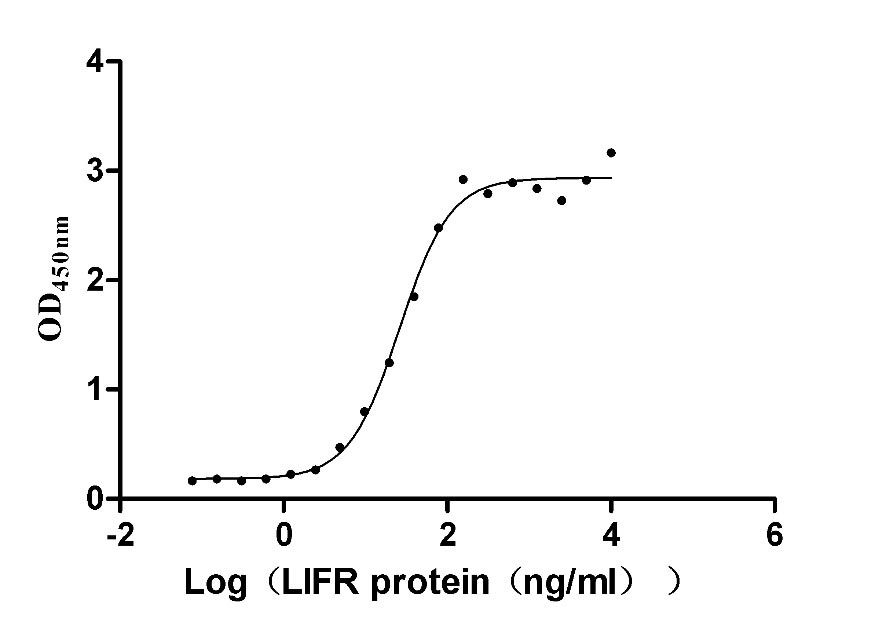
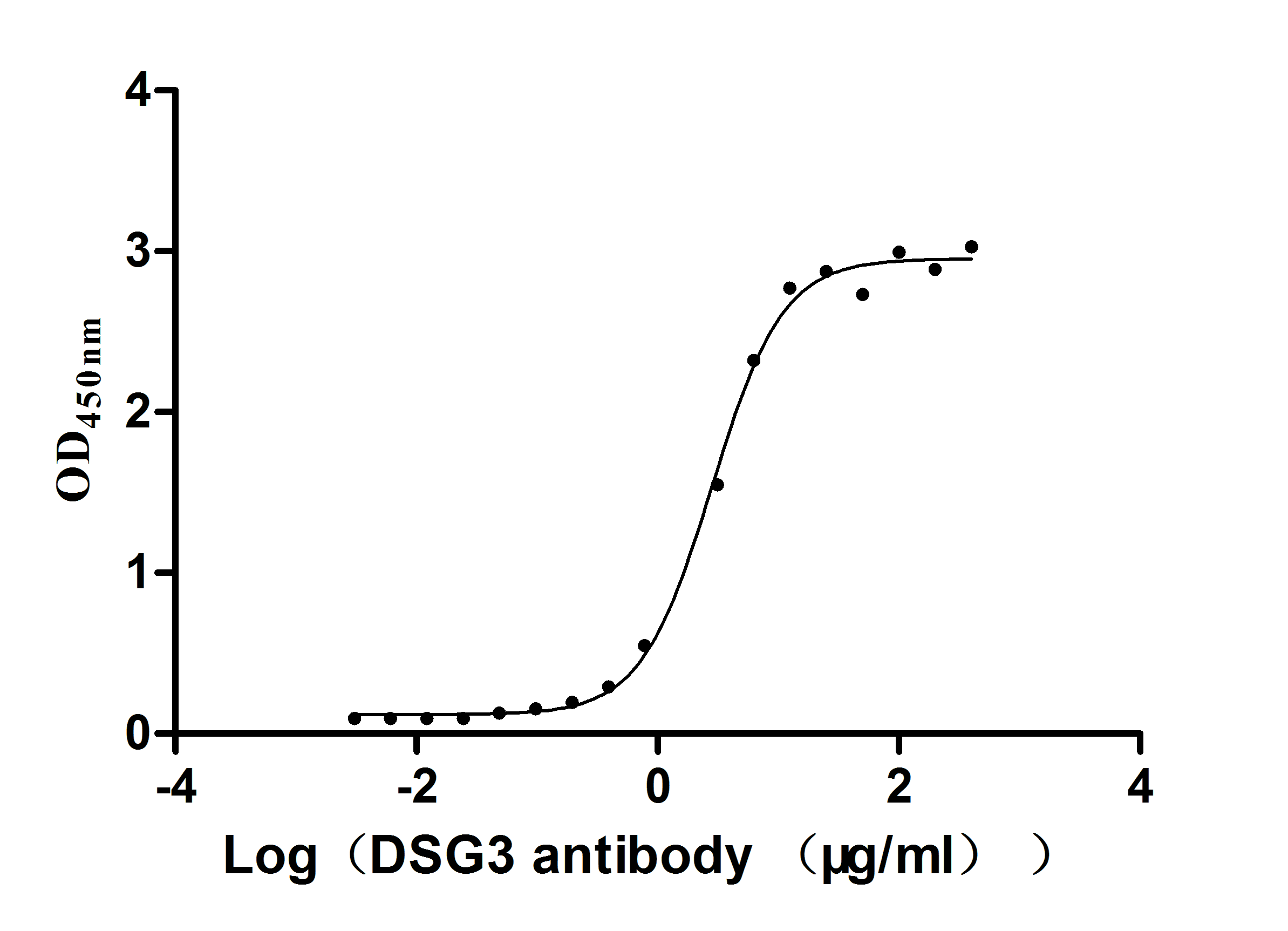

-AC1.jpg)
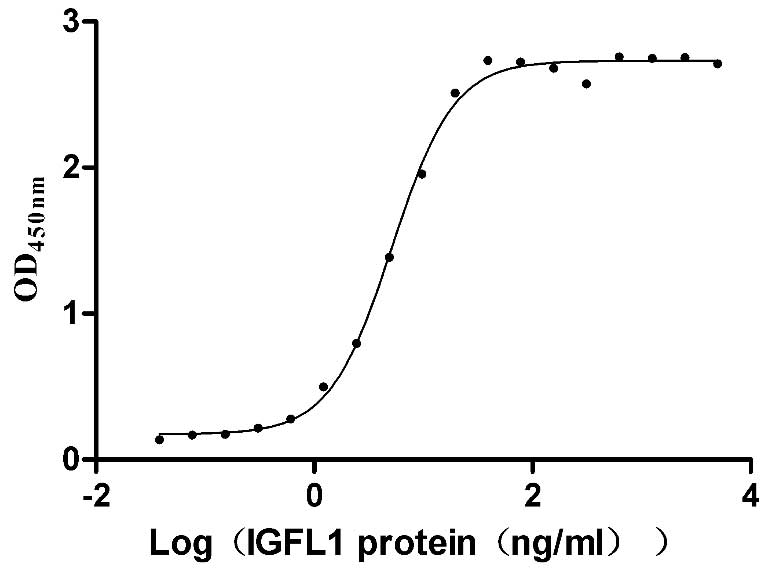
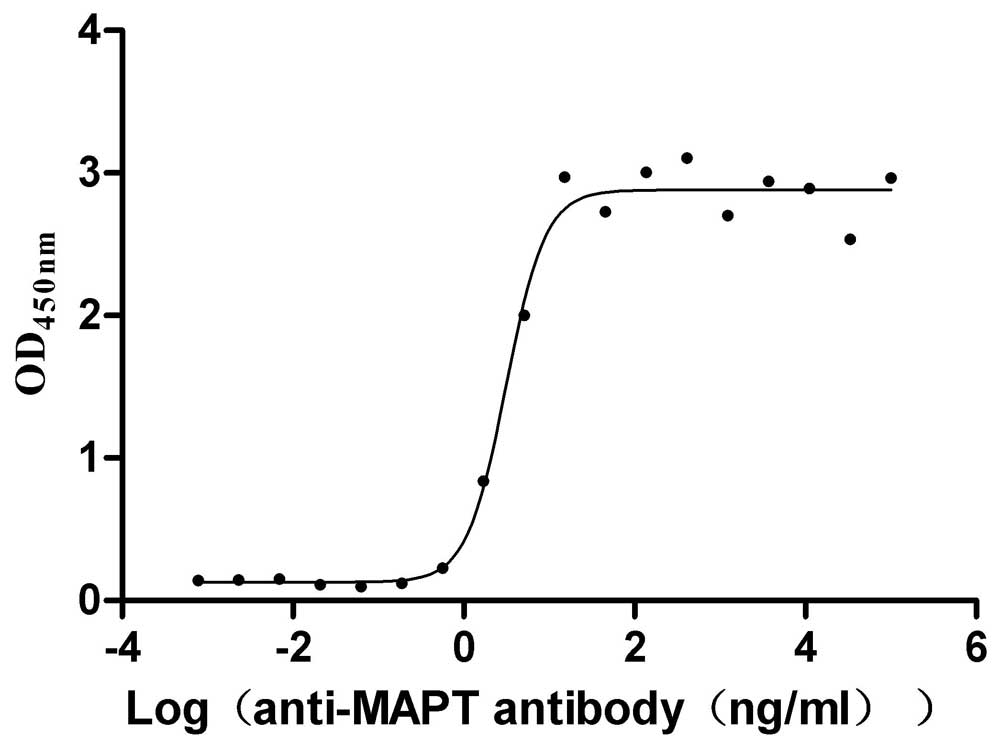
-AC1.jpg)
